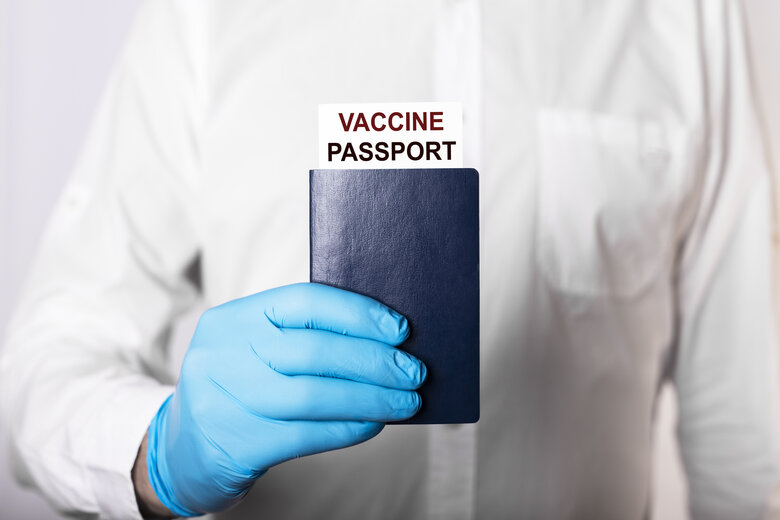
There are a number of obstacles standing in the way of wide-scale adoption of vaccine passports, writes Dr Sharon Hakkennes.

With the rollout of COVID-19 vaccines now underway across the country, Minister for Government Services Stuart Robert recently made the announcement that the Australian Immunisation Register (AIR) will be the record for all vaccinations for Australians, which will form the basis of the vaccination certificate that they will be able to use.
The Government aims to have as many Australians vaccinated as possible in 2021. Globally, it’s a different story – at the current pace, it’s likely to be a number of years before vaccine distribution and administration reaches most of the world’s population.
Digital vaccine certificates, also known as vaccine passports, are emerging as a solution with the potential to support business and society to continue to reopen across the country and across the world, while minimising the risk of a new wave of infection. They present an opportunity to facilitate the return of individuals vaccinated against COVID-19 to restricted spaces such as work locations and open borders for international travel.
In mid-January this year, a coalition of large technology and health companies launched the Vaccine Credential Initiative to create a system for storing and retrieving digital records of vaccinations. In the same time frame, the World Health Organisation (WHO) launched a digital health working group to develop a framework and standards for a smart digital vaccine certificate for yellow fever and COVID-19, paving the way to add other vaccines later.
High-profile efforts like these increase the potential that vaccine passports will become a reality, even as important questions remain, including the technology that will be used, the source and verification of data, and definitions of immunity among them.
Uncertainties
There are a number of obstacles standing in the way of wide-scale adoption of vaccine passports. Private and public sector organisations must understand the pitfalls, as well as the promise, so they can plan policies if they become a reality.
Key questions that stakeholders, including policymakers, are looking to answer include:
- Standardisation – Who will set the standards? Will there be multiple standards worldwide? How is immunity defined?
- Use – How will the certificates be used? For travel? Work? Entertainment? Will the uses pass legal scrutiny?
- Acceptance – Who will accept certificates? If there are multiple certificates, will some be accepted more widely than others?
- Buy-in – Will people use the certificates? Will certificates have the support of governments?
- Equity – Can people access and manage their digital information? Will certificates create social stigmas or exacerbate the digital divide?
- Governance – Who will oversee the systems and data? How will privacy be protected? How will forgery be identified and combatted?
- Usefulness – Will certificates go out-of-date if vaccines don’t provide long-term immunity? Will certificates need immunity information for multiple strains? Will different groups exhibit different levels of vaccine effectiveness?
- Verification – How will people with immunity be verified? Who will have access to immunisation records? How will that data be confirmed as accurate?
- Infrastructure – Can existing systems handle the data and security needs of digital certificates? Can these systems be integrated and offer interoperability?
- Unintended consequences – Will digital certificates create greater distrust of vaccines? Will it create extra steps for vaccination? Will people be incentivised to get infected to get a certificate?
Achieving wide-scale use
For a digital vaccine passport solution to work, it must achieve wide scale end-user adoption. Given the above challenges, organisations considering using vaccine passports must buy in to governance frameworks that allow for the acquisition, equity, verification and sharing of immunisation data.
At a high-level, a digital vaccine passport must enable consent-based COVID-19 vaccination records to be accessed in a secure, verifiable and privacy preserving way. It must work across organisational and jurisdictional boundaries. It must also be built on international standards and in a secure, decentralised infrastructure. Data standardisation, in terms of what data is acquired, how it’s formatted and exchanged, is critical.
While many questions remain about vaccine passports, the outlook appears promising. Data-driven applications have already provided significant aid in addressing the pressing, global scenarios spurred by the pandemic. Investigating this technology in the near-term will inform the plans and strategies of public and private sector organisations – positioning them to stand prepared to leverage this solution in returning to normal.
Sharon Hakkennes is a senior director analyst at Gartner, focused on ICT shared services delivery in the healthcare environment.
Comment below to have your say on this story.
If you have a news story or tip-off, get in touch at editorial@governmentnews.com.au.
Sign up to the Government News newsletter
Vaccination passports are not needed in every day movements of citizens within their own countries. Travelling outside your country of residence requires certain vaccines for certain destinations anyway. To allow businesses to discriminate against people who have no need to get covid vaccine is discrimination . This will create a divided nation. Australia is not in emergency pandemic trouble. To allow strangers to view or demand
proof of private medical information just to enter a store is such a breach of privacy. I certainly oppose some 18 year old demanding to view my private vaccination information. My medical information is not public information. Its my right to refuse anyone but my doctor access to my personal and private medical information. Giving strangers that right is a major breach of my privacy rights. Its no ones business what my choices on voluntary vaccination are. therefore they have no right to demand I show them. To be banned from retail shops or grocery stores for not getting a voluntary6 medical procedure is more than just a breach of my human rights its also isolating me from moving freely around my community even though I have no disease. Outcasting healthy people who are covid free all because they chose at that point in time not to vaccinate is a serious breach of rights and this will bring huge litigation issues with it.